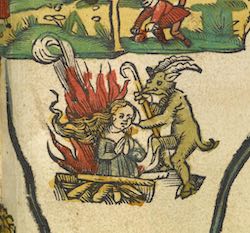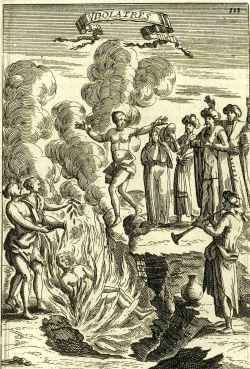Keyword: Satī
The Problem of Sati: John Locke’s Moral Anthropology and the Foundations of Natural Law
in: Journal of Early Modern History, v. 18 (2014), issue 1-2: pp.69-100.
The Iconographies of Sati
in: Sati, the Blessing and the Curse: The Burning of Wives in India, pp. 27-49
Oxford: Oxford University Press, 1994.
Pietro Della Valle's Letters on India
in: East and West, v. 2 (1952), issue 4: pp.205-217.
“Searching for the New”: Later Safavid Painting and the “Suz u Gawdaz” (“Burning and Melting”) by Nau’i Khabushani
in: The Journal of the Walters Art Museum, v. 59 (2001), issue : pp.115–130.
Die flambierte Frau: Sati in European Culture
in: Sati, the Blessing and the Curse: The Burning of Wives in India, pp. 35-50
Oxford: Oxford University Press, 1994.
Sati and the Task of the Historian
in: Journal of World History, v. 18 (2007), issue 3: pp.361-368.
La fenomenologia della sati nella Scommessa di Prometeo
in: Le mythe repensé dans l’œuvre de Giacomo Leopard, pp. 327-337http://books.openedition.org/pup/11256
Aix-en-Provence: Presses universitaires de Provence, 2016.
A Voyage to the East-Indies, with Observations on Various Parts There
London: Hooper & Morley, 1757.
Depiction of a satī on a map. A horned figure standing by a woman burning on a pyre (1522)
from: Claudii Ptolemaei... [Maps.C.1.d.11]
British Library, London
A New History of the East-Indies, Ancient and Modern
London: R. and J. Dodsley, 1744.
Les Veuves de Malabar: Sati, Colonialism, and the Enlightment
in: French Theatre, Orientalism, and the Representation of India, 1770-1865, pp. 19-71
Abingdon - New York: Routledge, 2021.
Interesting Historical Events, Relative to the Provinces of Bengal, and the Empire of Indostan
London: T. Becket & P. de Hondt, 1767.
Interesting historical events, relative to the provinces of Bengal, and the empire of Indostan
London: Becket & De Hondt, 1765-1771.
Sacrificed Wife, Sacrificer's Wife: Women, Ritual, and Hospitality in Ancient India
New York: Oxford University Press, 1996.
Surā, the liquor and the Vedic sacrifice
New Delhi: D.K. Printworld, 1999.
Itinerario, Voyage ofte schipvaert, van Jan Huygen van Linschoten naer Oost ofte Portugaels Indien
Amsterdam: Cornelis Claesz. , 1596.
‘Dead Women Tell No Tales:’ Issues of Female Subjectivity, Subaltern Agency and Tradition in Colonial and Post-colonial Writings on Widow Immolation in India
in: History Workshop Journal, v. (1993), issue : pp.208-227.
Idolatres (1685)
from: Allain Manesson Mallet, Description de l'Univers, , contenant les differents systêmes du monde, les cartes générals et particulières de la géographie ancienne et modern. Vol.: De l'Asie.


